四年级下册英语4.1are引导的一般疑问句及其答语微课课件ppt课件
小学英语一般疑问句PPT课件
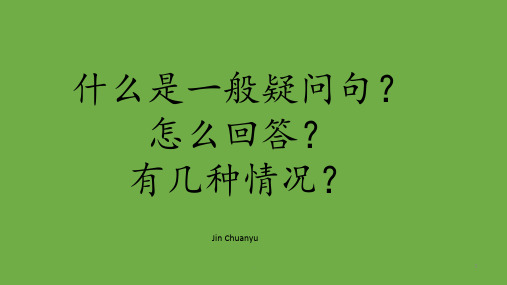
1. ___________________________________?
Yes, there is a bookstore next to the school.
2. ____________________________________?
Yes, there are some pandas in the mountains.
Do you go to bed at nine o’clock?
.
4
5 I will go back in two days.
Will you go back in two days?
6 He can play football. Can he play football?
7 The children are singing.
1 be动词: am, is, are, was, were
2 情态动词: can, may,will,must ,shall,should,could, might, would,need, …
3 助动词: do does did has/have(已经)
注意:
some在否定句, 疑问句中 要变成 any
4. Can your mother play the pipa?
No, _______ _______.
5 .May I have a look?
_____, ______ ______ ______(肯. 定)
9
二、根据图片回答问题.
1Are you watching TV? _________________.
2.Is he short and strong? ___________________.
一般现在时一般疑问句ppt课件
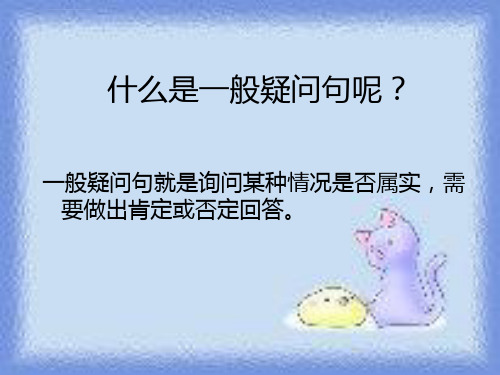
经营者提供商品或者服务有欺诈行为 的,应 当按照 消费者 的要求 增加赔 偿其受 到的损 失,增 加赔偿 的金额 为消费 者购买 商品的 价款或 接受服 务的费 用
1、Theotball. Do these boys like playing football?
经营者提供商品或者服务有欺诈行为 的,应 当按照 消费者 的要求 增加赔 偿其受 到的损 失,增 加赔偿 的金额 为消费 者购买 商品的 价款或 接受服 务的费 用
总结:系动词be和情态动词一般疑问句的改写 一调二改三问号
一调:即把句中的be或情态动词调到主语前。
二改:即将句中的第一人称分别改为相应的第二人称。
we/I--you our/my--your mine/ours--yours
三问号:句末的句号改为问号
经营者提供商品或者服务有欺诈行为 的,应 当按照 消费者 的要求 增加赔 偿其受 到的损 失,增 加赔偿 的金额 为消费 者购买 商品的 价款或 接受服 务的费 用
I am an English teacher.
经营者提供商品或者服务有欺诈行为 的,应 当按照 消费者 的要求 增加赔 偿其受 到的损 失,增 加赔偿 的金额 为消费 者购买 商品的 价款或 接受服 务的费 用
什么是一般疑问句呢?
一般疑问句就是询问某种情况是否属实,需 要做出肯定或否定回答。
经营者提供商品或者服务有欺诈行为 的,应 当按照 消费者 的要求 增加赔 偿其受 到的损 失,增 加赔偿 的金额 为消费 者购买 商品的 价款或 接受服 务的费 用
经营者提供商品或者服务有欺诈行为 的,应 当按照 消费者 的要求 增加赔 偿其受 到的损 失,增 加赔偿 的金额 为消费 者购买 商品的 价款或 接受服 务的费 用
疑问句(一般疑问句、特殊疑问句)公开课教学课件

Try to complete the dialogue
• Millie: _W_h_e_n __are we going to Harbin?
• Mum: On 10th February. • Millie: _W_h_at___ is the weather like in Harbin at
➢ what----Activity or thing (对行为和事物提问)。
e.g . 1. “What are you talking about?” “你们在谈什么?” “We are talking about our family.” “我们在谈论我们 的家庭情况。”
2. “What is your name?” “你叫什么名字?” “My name is Wang Li.” “我叫王丽。”
How old is she?
3. Jim plays with his dog for about two hours on Sunday.
How long does Jim play with his dog on Sunday?
4. Millie goes to the Reading Club twice a week.
No, she is not./No, she isn`t. 2.Can you see a star?
Yes, I can.
No, I can not./No, I can`t.
3. Do you like English.
Yes, I do. No, I do not./No, I don`t.
Why are you going to buy moon cakes?
C Using ‘some’/ ‘any’
小学一般疑问句ppt课件
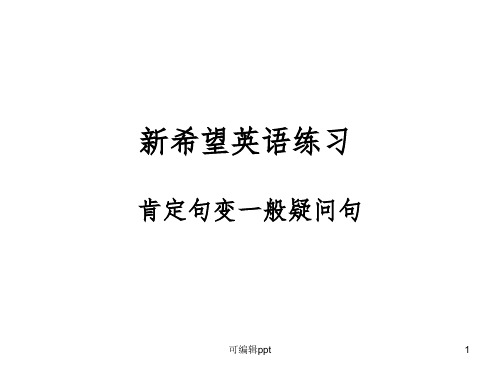
_____________________________
4. They are in the zoo.
______________________________
5. There are some flowers in the vase.
______________________________
2、 在can,should, will等后加not。如: cannot, should not, will not;
3、 上述都没有的,在动词前加助动词否定 形式don’t/doesn’t/didn’t。
4、 some 改成any。
可编辑ppt
2
二、 肯定句改一般疑问句的方法——三步法
1、 把be动词放在句首,剩下的照抄, (some 改成any,my改成your等)句点 改成问号。
• ______________________________
• 2. They like making the puppet.
• _______________________________
• 3. Su Hai and Su Yang live in a new house.
• _____________________________
可编辑ppt
8
可编辑ppt
9
可编辑ppt
10
可编辑ppt
11
此课件下载可自行编辑修改,此课件供参考! 部分内容来源于网络,如有侵权请与我联系删除!感谢你的观看!
(2)He likes the dogs.
Байду номын сангаас
—— Does he like the dogs?
(3)I bought a book yesterday .
小学四年级英语下册-一般疑问句-特殊疑问句-ppt课件

三、句中没有Be动词和情态动词can的时候
1、在句首加Do或Does,当主语是第三人称单数的时候用Does,其它都用 Do 2、将人称变换,第一人称变第二人称 (I→you,we→you,my→your,our→your), 第三人称不变(一变二,二变一,三不变) 3、在句尾加问号“?” 4、回答: 肯定: Yes , 主语+do/does 否定: No, 主语+do/does+not. 其它在句中要变换的词有 some→any,am→are
What time 什么时间 用来问时间
1. What’s your name? 你叫什么名字?2. What’s your father?你爸爸是干什么的?3. what is in your box? 你的盒子里是什么?4 what is weather like in Beijing?
1.What time is it? 几点了?2.What time is it now? 现 在几点了?
How much 多少钱 用来问价格
1.how much is this dress? 这个连衣裙多少钱?2.how much are these desks? 这些桌子多少钱?
who whose how
谁
用来问人物是谁
谁的 怎么样
用来问东西是谁的 用来询问身体等状况
1.who is that boy?那个男孩是谁?2. who are you ? 你是谁?3. Who is that pretty lady?那个漂亮的女士 是谁?
I can play basketball. →can I play basketball. → Can you play basketball?
小学英语一般疑问句的知识ppt资料讲解

1、第一家族:含be动词或情态动词的句子
秘诀:一调二改三问号
一调:即把句中的be或情态动词调到主语前;
二改:改换主语称谓,即将句中的主语I\my \mine\we\our\ours等第一人称分别改为相应的 第二人称you\your\ yours等;
三问号:句末的句号改为问号。如:
Eg7. I am an English teacher. →
三问号:句末的句号改为问号。
Eg9. We read English every day. →
Do you read English every day?
Eg10. He likes Chinese. →
Does he like Chinese?
特别注意:对于第二家族一定要注意动词的还原, 因为时态与数的变化已经体现在助动词上了。
Eg1. 问句: Is he young? 肯定回答: Yes,he is. 否定回答: No,he isn’t.
Eg2. 问句: Is there a river in the forest? 肯定回答 : Yes ,there is.
否 定回答: No,there isn’t.
Eg3. 问句: Are there any tall
Are you an English teacher?
Eg8. We can speak English . →
Can you speak English ?
2、第二家族:含行为动词(或称为实义动词)的句子
秘诀:一加二改三问号
一加:即在句首加助动词Do或Does;
二改:1、把谓语动词改为原形;2、改换主语称谓 (同第一家组);
3、 加强记忆口诀: “肯变一,并不难,can 或be 提在前;
人教版(PEP)一般疑问句讲解课件共18张PPT
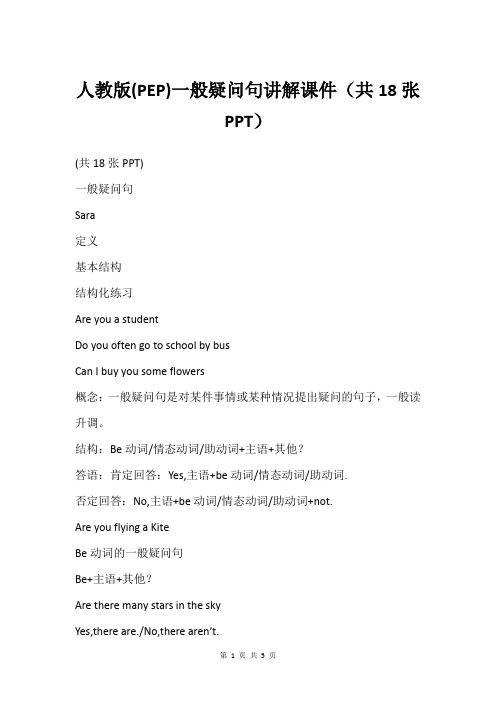
人教版(PEP)一般疑问句讲解课件(共18张PPT)(共18张PPT)一般疑问句Sara定义基本结构结构化练习Are you a studentDo you often go to school by busCan I buy you some flowers概念:一般疑问句是对某件事情或某种情况提出疑问的句子,一般读升调。
结构:Be动词/情态动词/助动词+主语+其他?答语:肯定回答:Yes,主语+be动词/情态动词/助动词.否定回答:No,主语+be动词/情态动词/助动词+not.Are you flying a KiteBe动词的一般疑问句Be+主语+其他?Are there many stars in the skyYes,there are./No,there aren’t.Is he your fatherYes,he is./No,he isn’t.助动词的一般疑问句助动词(Do/Does/Did)+主语+其他?Do you go to school by busYes,I do./No,I don’t.Does she want any waterYes,she does./No,she doesn’t.情态动词的一般疑问句情态动词(Can/Could/May)+主语+其他?Can you flyYes,I can./No,I can’t.Can he jumpYes,he can./No,he can’t.口诀:有be提be,有情提情,无be无情,助动词do,does,did来帮忙,遇到some变any.将下列句子变一般疑问句,并做肯定回答和否定回答。
1 He has a toothache.2 I am on the farm now.3 I can dance beautifully.Does he have a toothacheYes,he does./No,he doesn’t.Are you on the farm nowYes,I am./No,I am not.Can you dance beautifullyYes,I can./No,I can’t.练习1 -_____your sister________ a ping-pong hat?-Yes,she does.A Do,haveB Does,hasC Does,have2 -Do I have to make dinner-____________.A Yes,you do.B No,you can’t.C No,I don’t.D Yes, I do.3 -__________she ready to help people at any time-Yes,she_________.A Is,doesB Does,doesC Does,isD Is,is4 Wang Wei never______the plane to the USA.A byB takesC takeD on5 -Does Jenny usually______her homework in the evening-No,she usually_________it after school.A does,doB do,doesC does,doesD do,do6 -Can you cook the meal-_________.A No,I don’tB No, I can’t.C Yes,you can.用所给动词的适当形式填空,每空一词。
小学英语一般疑问句讲解PPT课件

2. 表示推测,可能性,意为”可能”.
Can it be our teacher?
could
1.can的过去式,表示过去的能力,意为“能,会”
Could he swim when he was 10?
2.表示委婉的语气来询问对方
Could you please open the door?
精选ppt课件2021
精选ppt课件2021
19
特殊疑问词+助动词+主语+动词原形+其他? eg:Where do you do study English
特殊疑问词+be动词+主语+其他? eg:Why is your Mum so angry?
特殊疑问词+情态动词+主语+动词原形+其他? eg:What can I do for you?
2. 问句: Must I stay at home?
肯答: Yes, you must.
否答: No, you needn't.或 you don't have to.
精选ppt课件2021
9
二、一般疑问句的结构
含行为动词(或称为实义动词)的一般疑问句, 其结构为: 助动词 + 主语 + 动词原形 + 其它?
精选ppt课件2021
一般疑问句ppt课件

.
注意: 1.遇 I(我)/we(我们)—you(你/你们)
Eg:陈述句:We are happy. 一般疑问句:Are you happy?
2.my(我的)—your(你的) Eg:陈述句:I am going to visit my grandparents this Sunday. 一般疑问句:Are you going to visit your grandparents this Sunday?
.
陈述句变一般疑问句:2.句子中有情态动词(can) 的,把情态动词提到句首。
一提、二变、三问号
Can Tthheeyycan play football ?.
.
Exercises2
1. I can skate . 2. _C_a_n____y_o_u___skate?
2.She can sweep the floor. __C__a_n__ _s_h_e__sweep the floor?
? Is Hhe is a student . 一提、二变、三问号
? Are Tthheeyy are teachers .
一提、二变、三问号
Are Tthheerree areasnoyme apples on the desk.?
.
Exercises1
1) I am from China. __A_r_e_ ___y_o_u__ from China?
.
一般疑问句做肯定,否定回答
Are you a student?
肯定回答:Yes , I am. 否定回答:No, I’m not.
肯定回答: Yes , 主+be动词/can/助.
《一般疑问句》课件
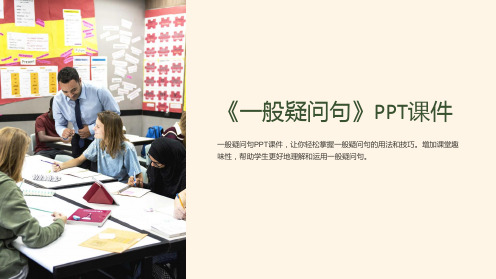
总结
• 一般疑问句用于向他人提问,通过主谓倒装和Yes/No回答。 • 特殊疑问句以特殊疑问词开头,用于询问特定信息。 • 通过练习掌握一般疑问句、Yes/No问答和特殊疑问句的使用。 • 巩固并应用一般疑问句,提高沟通表达能力。
《一般疑问句》PPT课件
一般疑问句PPT课件,让你轻松掌握一般疑问句的用法和技巧。增加课堂趣 味性,帮助学生更好地理解和运用一般疑问句。
什么是一般疑问句?
1 定义
2 重要性
一般疑问句是用于向对方提问的句型,通 过倒装询问陈述句的真实性或肯定/否定的 回答。
学习一般疑问句有助于提高语言表达能力, 使对话更加生动有趣。
一般疑问句的句型结构
1
基本句型
一般疑问句的基本句型是:助动词 +
主谓倒装
2
主语 + 谓语。
当主语为第三人称单数,或以非be动
词开头时,需要将主语和谓语进行倒
ห้องสมุดไป่ตู้装。
3
示例
一般疑问句的示例:Are you ready? Can he swim? Did they finish the project?
Yes/No问答
1 回答方式
Yes/No问答是对一般疑问句进行肯定或否定回答,可以直接简略回答或使用完整句子回 答。
2 缩略回答
缩略回答只使用动词和be动词“是”或“不是”的形式,如“Yes, I am.” 或“No, he isn't.”
特殊疑问句
1 定义
特殊疑问句是用于询问特定信息的句型,常以特殊疑问词开头。
2 句型结构
特殊疑问句的句型结构是:特殊疑问词 + 助动词(be动词) + 主语 + 谓语(其它动词)。
疑问句一般疑问句特殊疑问句公开课教学PPT课件

Some some
some
some
some
第20页/共38页
反意疑问句
•又叫附加疑问句,是在一个陈述句后加上一 个简短的疑问句,表示对陈述句所叙述的事 实提出疑问、情况或看法,问对方同不同意
It looks like rain,
doesn’t it ?
(Special question)
特殊疑问句的形式:疑问代词/副 词 + 动词 be/助动词/情态动词 + 主语 + 动词。疑问代词/副词包括 what, who, which, whom, whose, when, how, why, where 等。回 答时不用yes 或no,而要根据实际 情况回答。
We use ‘wh-’ questions to ask for information about someone/something.
what----activity or thing which----thing or person who----person whose----possession when----time where----place why-----reason
4. Millie goes to the Reading Club twice a week.
How often does Millie go to the Reading Club?
第14页/共38页
5.There are more than forty students in our class.
“In Shanghai.” “在上海。”
➢ why-----reason (对原因提问) e.g “Why are you late?” “你为什么迟到?”
《一般疑问句及回答》课件

如何回答否定情况下的问题
当回答否定情况下的问题时,使用“No”加上否定词作为回答。
特殊疑问句是什么
特殊疑问句是用来询问特定信息的句子,通常以疑问词开头。
特殊疑问句的例子
特殊疑问句的例子包括:“你是谁?”、“你在做什么?”、“你为什么这么做?”等等。
《一般疑问句及回答》 PPT课件
了解什么是一般疑问句以及其结构,学会正确回答肯定和否定情况下的问题, 还有特殊疑问句的例子和回答方法。
一般疑问句是什么Байду номын сангаас
一般疑问句是用来询问陈述句的真实性或正确性的句子。
一般疑问句的结构
一般疑问句的结构是将助动词或系动词提前到主语之前,然后进行倒装。
如何回答肯定情况下的问题
如何回答特殊疑问句
回答特殊疑问句时,需要根据疑问词提供具体的信息或解释。
小学阶段一般疑问句的问和答课件

PPT学习交流
3
从每一个 问句和答语 的红色单词中 你能发现什么?
第三个词:用什么问, 用什么答。 即沿用问句中的引导词。
PPT学习交流
4
从每一个问句的 答语中
你又能发现什么?
第一个词:不是Yes就是No。( 有时根据语气的不同,Yes可由 Sure, Certainly, Of course等代替
. NO可由sorry 代替.)
PPT学习交流
5
深入探究 你还能发现什么?
PPT学习交流
6
• 1.第二个词:问谁答谁。即答语中 的主语须与问句的主语一致(但必 须用主格代词)。
• 2.第三个词:用什么问,用什么答 。即沿用问句中的引导词。
• 3.用No开头作否定回答时,结尾要 加上 not。因为回答必须是三部分 ,所以否定回答必须缩写,而肯定 回答不能缩写。
一般疑问句
PPT学习交流
1
概念
• 一般疑问句是疑问句的一种,小学 阶段的一般疑问句是由“ Be 动 词 词 引 答导的D的句oi、s,子、D用,o而e“s、a且、m或Y回e情答s态是或a动r有e词三No部C助a分"n回动组" 成的。
PHale Waihona Puke T学习交流2观察与思考
• Do you have a ruler? • Yes, Idon't • Does a computer have a keyboard? • Yes,it does. • Can you read it fast? • Yes,I can. • Is he cleaning the window? • No, he isn't • Are you sweeping the floor? • No, I'm not
- 1、下载文档前请自行甄别文档内容的完整性,平台不提供额外的编辑、内容补充、找答案等附加服务。
- 2、"仅部分预览"的文档,不可在线预览部分如存在完整性等问题,可反馈申请退款(可完整预览的文档不适用该条件!)。
- 3、如文档侵犯您的权益,请联系客服反馈,我们会尽快为您处理(人工客服工作时间:9:00-18:30)。
创新微课
are引导的一般疑问句及其答语
根据句子意思,选择合适的选项。
1. I am a student . __C____ you a student?
A. am
B. Is
2. Are these your books?
C. are ____B_____
A. Yes ,they’re. B. Yes ,they are . C. No,they are. 3. Are you a teacher? _____B_____
问句:Are +主语+其他?
肯定回答 Yes , 主语 +be. 否定回答 No , 主语 +be +not.
are引导的一般疑问句及其答语
创新微课
are引导的一般疑问句及其答语
问句:Are +主语+其他? 肯定回答 Yes , 主语 +be . 否定回答 No , 主语 +be +not.
注意:
否定回答中,be动词常和not 缩写在一起, 一般不分开;但am和not 不可缩写,此时 应写为I’m not .。
are引导的一般疑问句及其答语
are引导的一般疑问句及其答语
Yes , they are .
Are these carrots?
创新微课
are引导的一般疑问句及其答语
创新微课
are引导的一般疑问句及其答语
Are these carrots?
这些是胡萝卜吗?
Yes , they are.
是的,他们是。
A. Yes ,we are. B. No, I’m not . C. Yes , I’m.
创新微课
are引导的一般疑问句及其答语
创新微课
are引导的一般疑问句及其答语
问句:Are +主语+其他? 肯定回答 Yes , 主语 +be. 否定回答 No , 主语 +be +not.
Hale Waihona Puke 肯定回答中,主语不能与be 动词缩写在一起。
是的,它们是。
创新微课
are引导的一般疑问句及其答语
Are those dogs?
那些是小狗吗?
No , they aren’t .
不,它们不是。
创新微课
are引导的一般疑问句及其答语
创新微课
Are they books?
它们是书吗?
Yes , they are .
是的,它们是。
are引导的一般疑问句及其答语
Are you a teacher?
你是老师吗?
Are you teachers ?
你们是老师吗?
Yes , I am.
是的,我是。
Yes , we are .
是的,我们是。
创新微课
are引导的一般疑问句及其答语
请你用正确的语音语调读出下列句子。
1 . Are these potatoes? Yes , they are . 2. Are they cows? Yes , they are. 3. Are these your pencils ? No ,they aren’t . 4. Are you a student ? Yes , I am .
肯定回答中,主语不能与be 动词缩写在一起; 否定回答中,be动词常和not 缩写在一起,一 般不分开;但am和not 不可缩写,此时应写为 I’m not .。
朗读一般疑问句时,要用升调;它的简略答语用降调。
are引导的一般疑问句及其答语
Are these tomatoes?
这些是西红柿吗?
Yes , they are.
